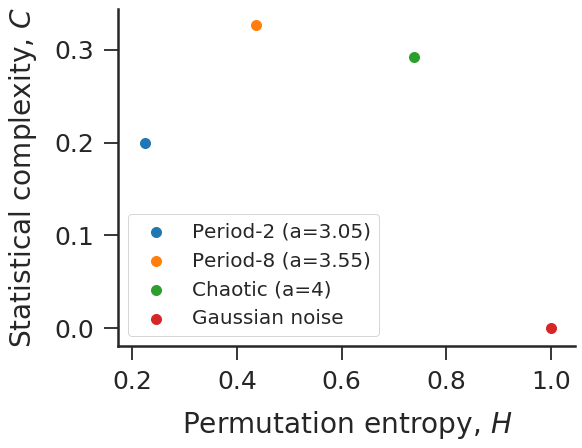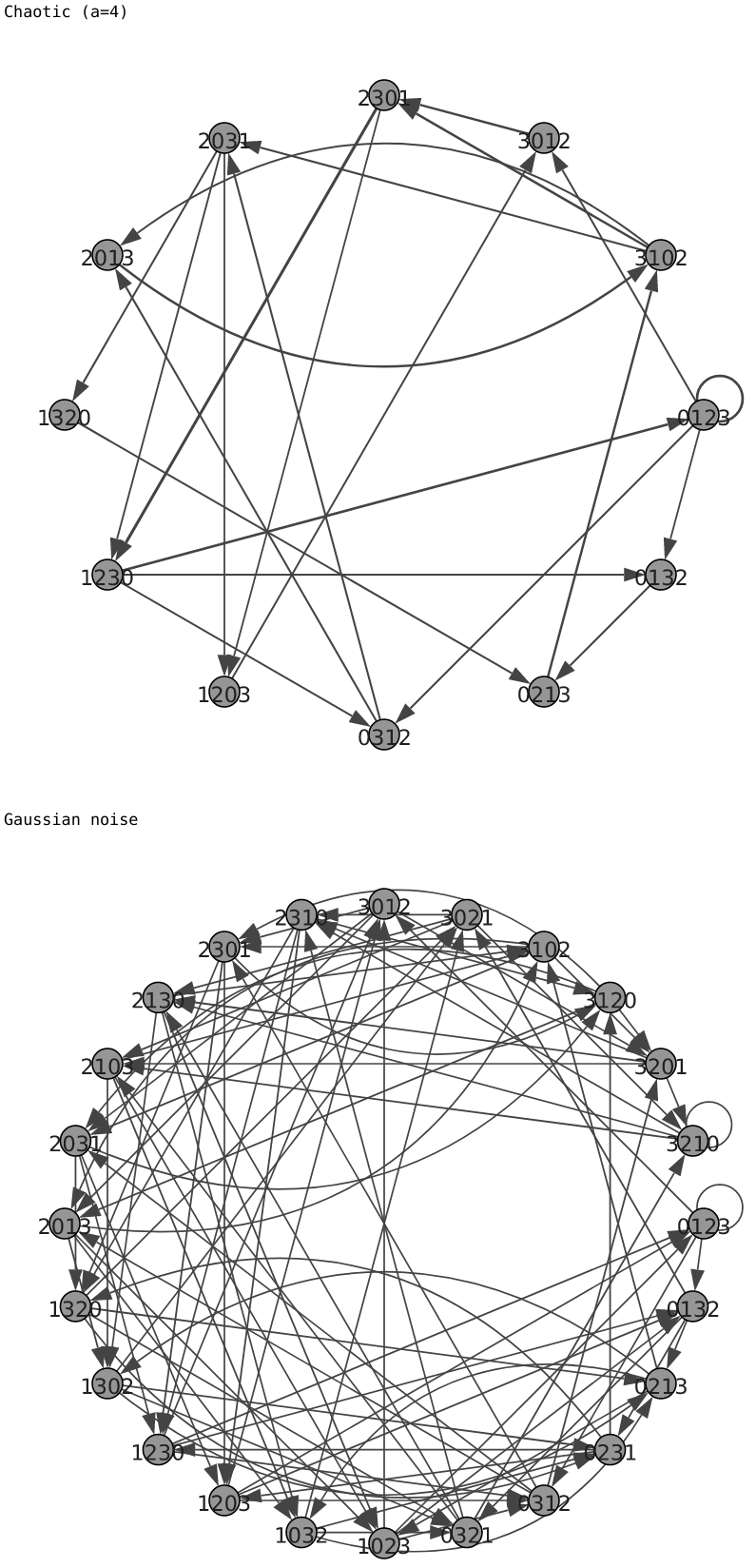A Python package for data analysis with permutation entropy and ordinal network methods
Project description
ordpy: A Python Package for Data Analysis with Permutation Entropy and Ordinal Network Methods
ordpy is a pure Python module [1] that implements data analysis methods based on Bandt and Pompe’s [2] symbolic encoding scheme.
If you have used ordpy in a scientific publication, we would appreciate citations to the following reference [1]:
A. A. B. Pessa, H. V. Ribeiro, ordpy: A Python package for data analysis with permutation entropy and ordinal network methods, Chaos 31, 063110 (2021). arXiv:2102.06786
@article{pessa2021ordpy,
title = {ordpy: A Python package for data analysis with permutation entropy and ordinal network methods},
author = {Arthur A. B. Pessa and Haroldo V. Ribeiro},
journal = {Chaos: An Interdisciplinary Journal of Nonlinear Science},
volume = {31},
number = {6},
pages = {063110},
year = {2021},
doi = {10.1063/5.0049901},
}ordpy implements the following data analysis methods:
Released on version 1.0 (February 2021):
Complexity-entropy plane for time series [4], [5] and images [3];
Multiscale complexity-entropy plane for time series [6] and images [7];
Tsallis [8] and Rényi [9] generalized complexity-entropy curves for time series and images;
Ordinal networks for time series [10], [11] and images [12];
Global node entropy of ordinal networks for time series [13], [11] and images [12].
Missing ordinal patterns [14] and missing transitions between ordinal patterns [11] for time series and images.
Released on version 1.1.0 (January 2023):
Weighted permutation entropy for time series [15] and images;
Fisher-Shannon plane for time series [16] and images;
Permutation Jensen-Shannon distance for time series [17] and images;
Four pattern permutation contrasts (up-down balance, persistence, rotational-asymmetry, and up-down scaling.) for time series [18];
Smoothness-structure plane for images [19].
Released on version 1.2.0 (April 2025):
Two-by-two ordinal patterns for images [20].
For more detailed information about the methods implemented in ordpy, please consult its documentation.
Installing
Ordpy can be installed via the command line using
pip install ordpyor you can directly clone its git repository:
git clone https://github.com/arthurpessa/ordpy.git
cd ordpy
pip install -e .Basic usage
We provide a notebook illustrating how to use ordpy. This notebook reproduces all figures of our article [1]. The code below shows simple applications of ordpy.
#Complexity-entropy plane for logistic map and Gaussian noise.
import numpy as np
import ordpy
from matplotlib import pylab as plt
def logistic(a=4, n=100000, x0=0.4):
x = np.zeros(n)
x[0] = x0
for i in range(n-1):
x[i+1] = a*x[i]*(1-x[i])
return(x)
time_series = [logistic(a) for a in [3.05, 3.55, 4]]
time_series += [np.random.normal(size=100000)]
HC = [ordpy.complexity_entropy(series, dx=4) for series in time_series]
f, ax = plt.subplots(figsize=(8.19, 6.3))
for HC_, label_ in zip(HC, ['Period-2 (a=3.05)',
'Period-8 (a=3.55)',
'Chaotic (a=4)',
'Gaussian noise']):
ax.scatter(*HC_, label=label_, s=100)
ax.set_xlabel('Permutation entropy, $H$')
ax.set_ylabel('Statistical complexity, $C$')
ax.legend()
#Ordinal networks for logistic map and Gaussian noise.
import numpy as np
import igraph
import ordpy
from matplotlib import pylab as plt
from IPython.core.display import display, SVG
def logistic(a=4, n=100000, x0=0.4):
x = np.zeros(n)
x[0] = x0
for i in range(n-1):
x[i+1] = a*x[i]*(1-x[i])
return(x)
time_series = [logistic(a=4), np.random.normal(size=100000)]
vertex_list, edge_list, edge_weight_list = list(), list(), list()
for series in time_series:
v_, e_, w_ = ordpy.ordinal_network(series, dx=4)
vertex_list += [v_]
edge_list += [e_]
edge_weight_list += [w_]
def create_ig_graph(vertex_list, edge_list, edge_weight):
G = igraph.Graph(directed=True)
for v_ in vertex_list:
G.add_vertex(v_)
for [in_, out_], weight_ in zip(edge_list, edge_weight):
G.add_edge(in_, out_, weight=weight_)
return G
graphs = []
for v_, e_, w_ in zip(vertex_list, edge_list, edge_weight_list):
graphs += [create_ig_graph(v_, e_, w_)]
def igplot(g):
f = igraph.plot(g,
layout=g.layout_circle(),
bbox=(500,500),
margin=(40, 40, 40, 40),
vertex_label = [s.replace('|','') for s in g.vs['name']],
vertex_label_color='#202020',
vertex_color='#969696',
vertex_size=20,
vertex_font_size=6,
edge_width=(1 + 8*np.asarray(g.es['weight'])).tolist(),
)
return f
for graph_, label_ in zip(graphs, ['Chaotic (a=4)',
'Gaussian noise']):
print(label_)
display(SVG(igplot(graph_)._repr_svg_()))
Contributing
Pull requests addressing errors or adding new functionalities are always welcome.
References
Project details
Release history Release notifications | RSS feed
Download files
Download the file for your platform. If you're not sure which to choose, learn more about installing packages.
Source Distribution
Built Distribution
Filter files by name, interpreter, ABI, and platform.
If you're not sure about the file name format, learn more about wheel file names.
Copy a direct link to the current filters
File details
Details for the file ordpy-1.2.2.tar.gz.
File metadata
- Download URL: ordpy-1.2.2.tar.gz
- Upload date:
- Size: 27.8 kB
- Tags: Source
- Uploaded using Trusted Publishing? No
- Uploaded via: twine/6.2.0 CPython/3.9.25
File hashes
| Algorithm | Hash digest | |
|---|---|---|
| SHA256 |
9169fa7ecfb26c29886c25c1e4fe00f3a4fd4e9132fff0ea912d943c798f1799
|
|
| MD5 |
5118bf3d3e049a17ee7dee720956c216
|
|
| BLAKE2b-256 |
e5232947a838a81a9cbe46e9fcb7c0246974ecf279bc02f62b1f1e89ab81041e
|
File details
Details for the file ordpy-1.2.2-py3-none-any.whl.
File metadata
- Download URL: ordpy-1.2.2-py3-none-any.whl
- Upload date:
- Size: 26.9 kB
- Tags: Python 3
- Uploaded using Trusted Publishing? No
- Uploaded via: twine/6.2.0 CPython/3.9.25
File hashes
| Algorithm | Hash digest | |
|---|---|---|
| SHA256 |
f5e9425369bdddf28a973562b365cb0fc2271716dad396dede3467861c78d3ac
|
|
| MD5 |
1b4a7090df8d9cdf282bf925df80d924
|
|
| BLAKE2b-256 |
1576e6429d4133eb0ddc6e6fc0b3a8dcbe1e5a738c4a07c29187b55db95302de
|
















